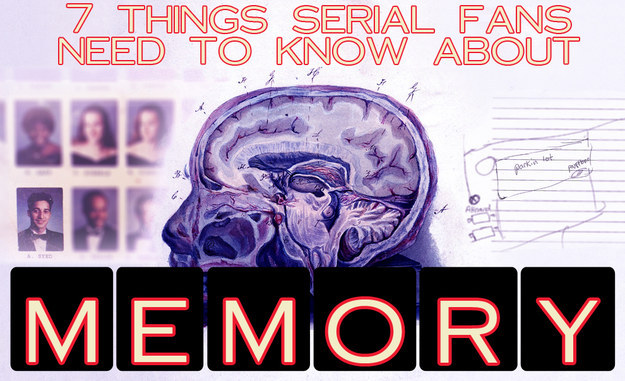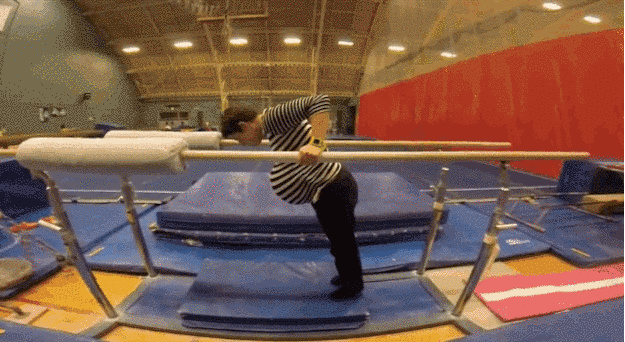The mind is a terrifying and fascinating thing.
Wellcome Library, London / Tom Phillips / BuzzFeed
We don’t remember everything that we experience.

Wellcome Library, London / Tom Phillips / BuzzFeed
At The Conversation, Amanda Barnier, a professor of cognitive science at Macquarie University, Australia, writes:
In essence, memory can be thought of as a sequence of information-processing stages with three basic tasks:
1. get information in (encoding) 2. save information over time (storage) 3. get information out (retrieval).
Things that we experience go into our sensory memory and stay there for a few seconds. If we pay attention to them, they’ll get lodged in our short-term memory – which can hold a few chunks of information for about 20 seconds. But if you don’t then use or rehearse the information in your short term memory, you’ll forget it.
That’s why, if a day has no particular significance, or you have no reason to recall it in the near future, you won’t necessarily remember the details of where you were or what you did.
If you do rehearse the information in your short-term memory – calling a phone number that someone just told you, for example – it can enter your long-term memory and you might be able to recall it much later.
Lots of factors can influence how someone remembers something.
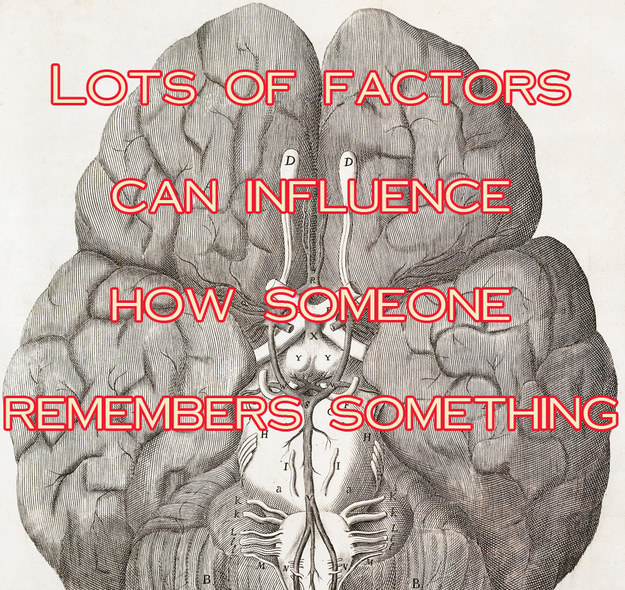
Wellcome Library, London / Tom Phillips / BuzzFeed
“Significant or emotional events typically are better remembered, especially when well rehearsed,” Barnier writes. “But even reported memories of significant, well-rehearsed events can vary over time. Such fluctuations may be important or unimportant; it is difficult to tell.”
And interviewers can influence how a person remembers an event. According to a Forensic Outreach report: “A witness’s memory report will be influenced by the interviewer’s questioning style, the content of questions, and the verbal and nonverbal feedback received.”
Long-term memory can last a really, really long time.
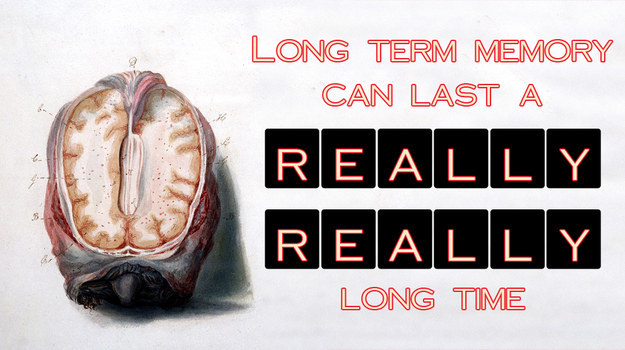
Wellcome Library, London / Tom Phillips / BuzzFeed
There’s no apparent limit on the amount you can store in your long-term memory, and it can last a lifetime. Paul Reber, professor of psychology at Northwestern University, told Scientific American:
“Neurons combine so that each one helps with many memories at a time, exponentially increasing the brain’s memory storage capacity to something closer to around 2.5 petabytes. […] You would have to leave the TV running continuously for more than 300 years to use up all that storage.”
So if what happened years ago makes it into your long-term memory, it could potentially be there forever. But there’s no guarantee that a memory you have is real…
“False memories” are surprisingly easy to plant.
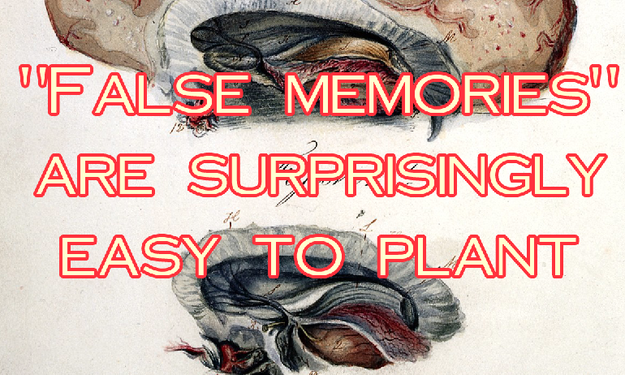
Wellcome Library, London / BuzzFeed
In a simple lab test, psychologists gave people a list of words related to sleep (bed, rest, awake, etc.) but didn’t actually include the word “sleep” in the list. Later, participants mistakenly remembered the word “sleep” as often as they did words that were actually on the list.
Another study made a “sizable minority” of people involved believe they’d had a bad experience with Pluto at Disneyland as a child just by showing them material that suggested it had happened.
This phenomenon is why it’s easy for witnesses of a crime to remember things that didn’t happen, without even being aware of it. All they need is for someone to suggest that it could have happened, and the seed of a false memory might be planted.
Bonus fun fact: A recent study found being sleep-deprived makes you to forming false memories.
It’s almost impossible to tell whether a memory is real or fake.
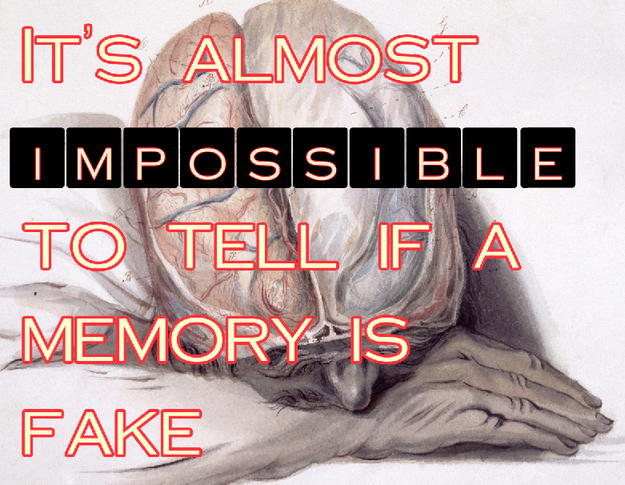
Wellcome Library, London / BuzzFeed
At least one study has shown that real memories have more sensory details, such as those relating to smell, sight and hearing. But a spokesperson for Forensic Outreach told BuzzFeed over email that “without another witness it is near impossible to distinguish a real memory from a false one.”
Obviously, that doesn’t stop anyone trying. There are a few techniques people use to try to judge the veracity of someone’s memory. According to a 2009 paper published in Perspectives on Cognitive Science, cognitive scientists try to judge the memory itself or a group of memories, whereas investigators tend to try to figure out if a person should be believed.
It gets more complicated when you consider that with false memories, people don’t know that they’re lying. In the 2009 paper, Daniel Bernstein and Elizabeth Loftus write:
Many cases of allegedly recovered memories have turned out to be false memories implanted by well-meaning therapists who use suggestion and imagination to guide the search for memories. The more elaborate and detailed the implanted false memory is, the more real and authentic it will seem to the individual, and the harder it will be to determine whether it is true or false.
Juries tend to base their decision on eyewitness statements more than they should.
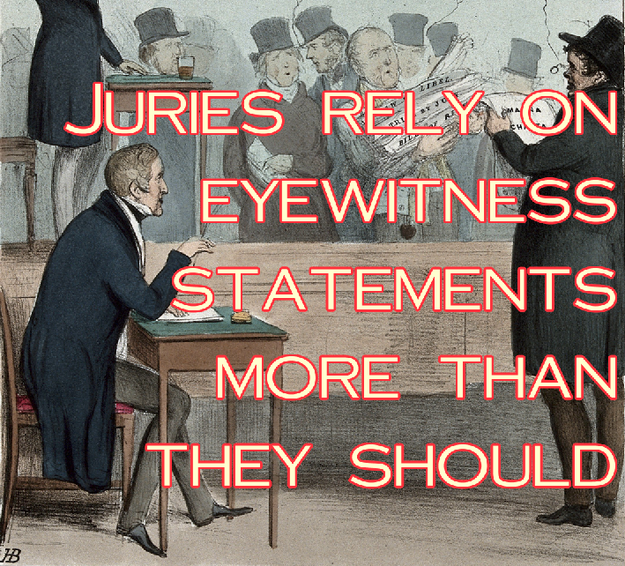
Wellcome Library, London / BuzzFeed
According to the Innocence Project, eyewitness misidentification is responsible for 72% of convictions that have been overturned by DNA testing.
Jurors tend to not be aware of factors that could affect the reliability of an eyewitness’ testimony and as a result base their decisions quite heavily on that testimony. “This is especially the case when the eyewitness is confident in their story,” a Forensic Outreach spokesperson told BuzzFeed. “However, confidence does not always result in accurate testimony.”
We tend to trust detailed and complete accounts of events more than fragmented or inconsistent ones – but just because a story is detailed, that doesn’t mean it is accurate.
A 2011 study that looked at how many jurors are aware of these factors concluded that “judges appear to overestimate the ability of jurors to distinguish between accurate and inaccurate eyewitnesses and thus overestimate jurors’ common sense.”
But telling jurors about eyewitness fallibility helps.
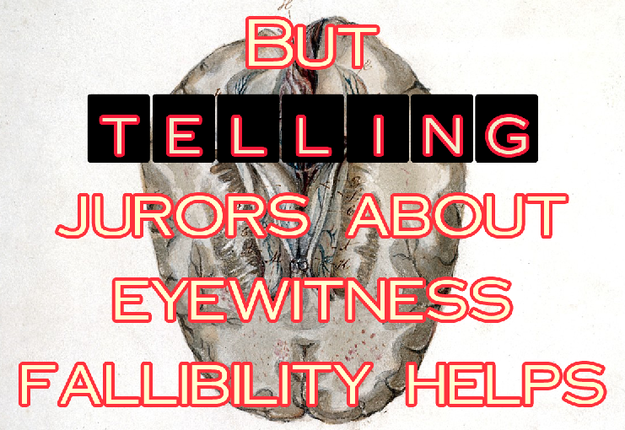
Wellcome Library, London / BuzzFeed
There is hope: An expert testifying on the factors that can influence eyewitness testimony appears to stop jurors relying on the confidence of a witness as a measure of accuracy in their weighing up of the evidence.










